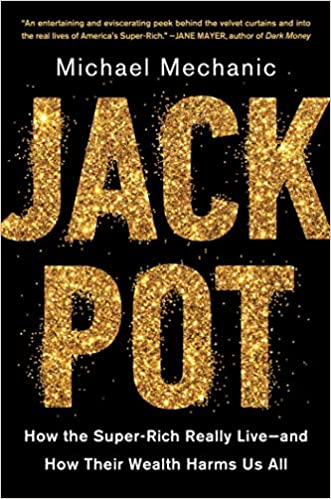 Jackpot: How the Super-Rich Really Live—and How Their Wealth Harms Us All by Michael Mechanic
Jackpot: How the Super-Rich Really Live—and How Their Wealth Harms Us All by Michael Mechanic
Published in April of 2021.
Is higher education an engine of opportunity or a system designed to concentrate privilege?
The problematic but accurate answer to this question is, of course, “yes.”
As Fitzgerald noted in 1936, “The test of a first-rate intelligence is the ability to hold two opposed ideas in mind at the same time and still retain the ability to function.”
Anyone interested in the relationship between economic inequality and higher education will likely enjoy reading Jackpot.
Unlike many books that I review in this space that I try to relate (however tenuously) to higher ed, Jackpot has an entire chapter devoted to our industry.
In Jackpot, longtime Mother Jones senior editor and progressive journalist Michael Mechanic analyzes issues of wealth and inequality from a refreshingly creative angle.
Mechanic’s thesis is that wealth concentration is detrimental to all of society. That extreme levels of economic stratification cause harm to both the poor and the rich alike.
For you and me, the idea that personal wealth might be a sub-optimal outcome is a difficult concept to grok.
Who wouldn’t want to have a liquidity event? We are talking about sudden wealth from shares in an IPO, or an inheritance or a lottery win – jackpots all.
It turns out that the suddenly wealthy are miserable.
Extreme wealth can make relationships transactional while removing the motivation for achievement. The kids of the very wealthy are the worst off in terms of outcomes such as substance abuse and relationship challenges.
As Mechanic admits, nobody feels sorry for the rich. We’d all like to have those problems
In Jackpot, Mechanic is out to convince those at the top of the economic heap that it is their self-interest to support pro-equality policies. He makes the case that rising inequality has made society more dangerous and less stable.
Extreme levels of inequality are even bad for the bottom line. Regressive tax policies, low minimum wages, and inadequate childcare reduce the buying power of consumers while limiting the pool of qualified workers.
On the higher education side, Mechanic points out how the current system privileges the privileged.
Among the advantages that the children of the wealthy enjoy are access to tony private high schools and highly resourced public schools. These schools have long track records of funneling students into highly selective colleges and universities.
The advantages of wealth extend to admissions criteria that benefit legacy applicants and those that can pay full tuition.
Again, a higher education system structured to advantage the wealthy is – in Mechanic’s estimation – more fragile than one designed to serve everyone.
Are the arguments in Jackpot convincing?
Will billionaires fight for progressive economic policies after reading this book?
Will certain universities in which more students attend from the top one percent of the household income distribution than the bottom fifty percent make the sacrifices necessary to reverse that ratio?
Is appealing to the self-interest of the privileged as a way to address growing inequality a viable strategy?
Could work.
What are you reading?
Stay connected with us on social media platform for instant update click here to join our Twitter, & Facebook
We are now on Telegram. Click here to join our channel (@TechiUpdate) and stay updated with the latest Technology headlines.
For all the latest Education News Click Here
For the latest news and updates, follow us on Google News.
